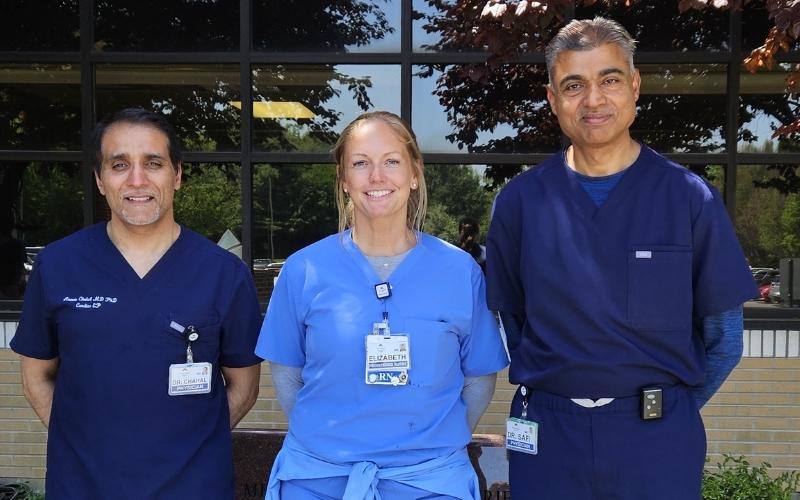Greg Lesher had been diagnosed with sleep apnea, a condition where his breathing stopped many times during sleep and likely had led to a problem he was having with his heart. He didn’t know it, but he also had another issue that was endangering his heart.
At the end of the day, the 67-year-old Waynesboro man often was simply exhausted. A self-employed farm machinery mechanic, he chalked it up a little bit to his active job. And he kept slogging through his days.
Like many men, Greg can be a little stubborn about acknowledging and seeking help for his health challenges. In one U.S. survey, 65% of men said they avoid seeking medical attention for as long as possible, citing reasons such as being too busy and believing ailments will heal by themselves.
It took a series of concerning test results and some very strong family persuasion – Greg’s daughter, Lorie, happens to be an emergency room nurse at WellSpan Chambersburg Hospital – for Greg to finally seek care. The precise, individualized cardiac treatment he received from a team of WellSpan cardiologists, nurses and other caregivers was a revelation to Greg.
“It was personal care,” he says. “I never met these people before, but it was personal.”
Greg now is feeling much better and was so inspired by his experiences he asked Lorie to help him nominate two of his nurses for a Daisy Award, in recognition of their compassionate and exceptional care. He also made a donation to WellSpan Chambersburg Hospital.
Getting Greg to the hospital
Greg is active and does not smoke. He wasn’t taking any medications for chronic health conditions. He thought he was in pretty good shape though he knew he had issues he had to handle.
He was wearing a breathing device at night to help with his sleep apnea, but it was a struggle. He didn’t like the way it felt and was trying different masks to try to improve the treatment. Greg also had been diagnosed with “heart block,” when the heart’s electrical signals are disrupted, causing the heart to beat too slowly or irregularly, leading to symptoms including fatigue. His physician told him that at some point he would need a pacemaker, an implanted device that regulates the heart’s rhythm.
Greg thought he had some time. But his body was telling him something different, his heart sometimes fluttering as it felt like it skipped a beat, his body drained of stamina.
Finally, Diane, his wife of 45 years, got him to see his family doctor, who ran some tests on his heart and recommended Greg go straight to a local emergency room. Remember, Greg is a stubborn man.
“I came home and stewed around a little bit and got in my service truck and went up Emerson Valley to work on a tractor,” he says.
That night, he realized he could not put it off any longer and went to the emergency department of WellSpan Chambersburg Hospital. He was admitted and underwent a stress test, which he didn’t even finish. He needed the pacemaker.
Getting Greg the right care
Before Greg got his pacemaker, WellSpan cardiologist Dr. Daniel Kosinski, who was managing Greg’s care, had some concerns. He wanted Greg to undergo a heart catheterization, a procedure where a thin, flexible tube is inserted into a blood vessel and guided to the heart. It's used to diagnose and treat various heart conditions, including coronary artery disease.
Dr. Arshad Safi, an interventional cardiologist and Dr. Kosinski’s colleague, did the procedure, which revealed that Greg had a 70% blockage of the artery that doctors call “the widow maker.” This was a new problem that Greg did not know he had but was so grateful that it was discovered.
Dr. Safi used a balloon to clear the blockage and then placed a stent, a tiny mesh tube, to hold open the artery in Greg’s heart.
Then a third cardiologist, Dr. C. Anwar A. Chahal, implanted Greg’s pacemaker.
“I just had a nagging feeling we were missing something and wanted to ensure that we had identified all of Greg’s underlying conditions,” Dr. Kosinski says. “Every patient comes in the door with a unique health history and combination of factors that determine how we deliver care for them. We want to make sure we are seeing the full picture of them so our expert team can treat their heart problems.”
Greg has high praise for the doctors who found and fixed his heart problems as well as his entire care team, including two nurses: Patti Plasterer and Elizabeth Seeders. Both nurses offered competence and a calm confidence, as well as a smile, joking with him when Greg teased that he was going to use Mountain Dew as his blood thinner.

Members of Greg's care team included (from left) cardiologist Dr. C. Anwar A. Chahal, nurse Elizabeth Seeders and cardiologist Dr. Arshad Safi.
Getting Greg back to life
With his pacemaker and stent, Greg feels renewed energy. He also is talking to a physician about exploring a new treatment for his sleep apnea, including Inspire, an implanted device that helps keep the airway open during sleep.
He is very thankful to have gotten the right care at the right time from the right people.
“That team is a good bunch. We appreciate them,” he says. “We want to pat them on the back. They deserve it.”
Find out more about your own heart health by taking our heart risk assessment here.
Tags:


